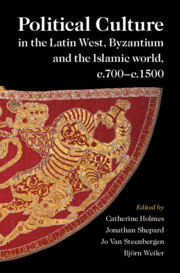 Political Culture in the Latin West, Byzantium and the Islamic World, c.700–c.1500
Political Culture in the Latin West, Byzantium and the Islamic World, c.700–c.1500 Book contents
- Political Culture in the Latin West, Byzantium and the Islamic World, c.700–c.1500
- Political Culture in the Latin West, Byzantium and the Islamic World, c.700–c.1500
- Copyright page
- Contents
- Figures and Maps
- Contributors
- Preface and Acknowledgements
- Abbreviations
- General Maps
- 1 Political Culture in Three Spheres
- 2 Reflections on Political Culture in Three Spheres
- Part I Sources
- Part II Historical Contexts
- 7 The Latin West
- 8 Byzantium
- 9 The Islamic World
- Part III Norms, Values and Their Propagation
- Part IV Practice and Organisation
- Part V Conclusions
- Appendix
- Glossary
- Index
7 - The Latin West
Pluralism in the Shadow of the Past
from Part II - Historical Contexts
Published online by Cambridge University Press: 11 August 2021
- Political Culture in the Latin West, Byzantium and the Islamic World, c.700–c.1500
- Political Culture in the Latin West, Byzantium and the Islamic World, c.700–c.1500
- Copyright page
- Contents
- Figures and Maps
- Contributors
- Preface and Acknowledgements
- Abbreviations
- General Maps
- 1 Political Culture in Three Spheres
- 2 Reflections on Political Culture in Three Spheres
- Part I Sources
- Part II Historical Contexts
- 7 The Latin West
- 8 Byzantium
- 9 The Islamic World
- Part III Norms, Values and Their Propagation
- Part IV Practice and Organisation
- Part V Conclusions
- Appendix
- Glossary
- Index
Summary
Defining an entity so geographically, culturally and linguistically varied as the Latin west is difficult: despite the spectacular achievements of the Carolingians and Ottonians, fragmentation and plurality prevailed. Smaller political structures proved more durable, and, while the English and French realms gained sharper definition from the twelfth and thirteenth centuries on, the western empire became a loose federation headed by secular princes, lesser nobles and urban communities – all setting their own codes of conduct. New polities emerged on Christendom’s margins, adopting some Carolingian and Ottonian norms and administrative practices. The church – especially the papacy from the thirteenth century on – set the tone, holding kings and other secular rulers to account, while universities were both agents of clerical control and breeding grounds of dissent. But the range of participants in the political game was expanding, imposing limits on royal power, bringing access to additional resources and offering a potential counterweight to papal power. This was one of the west’s many paradoxes: strong elements of unity alongside the gravitational pull of many different centres.
- Type
- Chapter
- Information
- Political Culture in the Latin West, Byzantium and the Islamic World, c.700–c.1500A Framework for Comparing Three Spheres, pp. 133 - 177Publisher: Cambridge University PressPrint publication year: 2021


